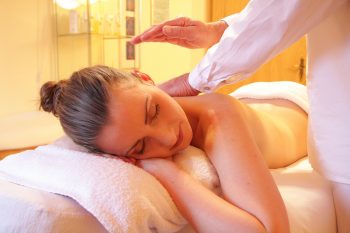The German Kur Posted by Constanze on Sep 19, 2018 in Culture, Language
When you need to take a period of sick leave from work, you generally stay at home during that time, right? In Germany, when you`re ill, as part of the Krankenkasse (German health insurance), you can request to be sent on a Kur – a type of spa break.
Die Kur – literally ‘the cure’ – is a maximum 3 week-long period of work leave that can be taken every 3 years. Your Arzt (doctor) must prescribe the Kur – much like a regular sick note, but with far more paperwork involved. It is prescribed either if you are stressed to the point of Krankheit (illness), or if you have a chronische Erkrankung (chronic ilness) that needs to be managed or minimised in some way. If your application is successful, you can take the time off in the form of a spa break known as a Kur– and you don’t even have to pay for it.
The Kurort refers to the location of the Kur. When you apply, different Kurorte (spa towns) will be recommended to you, depending on your condition. There are various types of spas where Wasser (water) is predominantly used as treatment, but there are also Luftkurorte (‘air spa towns’), renowned for and selected specifically for their fresh, clean Luft (air).
At the Kur you will have treatment tailored to you, including an Ernährungsplan (nutrition plan) and a Trainingsregime (exercise programme), and have medical experts on hand to help. There are strict rules that you follow these and treat the Kur seriously, rather than as an Urlaub (holiday)!
The idea of a Kur is to prevent stress-related illnesses and chronic conditions either from developing in the first place, or from becoming worse due to work-related activities. The idea is that Germans will work for longer and be more produktiv (productive) if they are able to relax and rejuvenate properly, and/or if the potential illness is stopped before it can develop. This is called die Vorbeugung (prevention) in German. And this is how the Kur initiative is of benefit to German employers. But the concept of a Kur is no new thing; it has been around in one way or another since the Mittelalter (Middle Ages).
In general, die Hydrotherapie (hydrotherapy) and bathing are valued aspects of German life. Many German town names have the word Bad (bath) in them: There’s Wiesbaden, Marienbad, Bad Kreuznach, Bad Wildbad, Bad Tölz, Bad Kissingen and, perhaps the most famous of them all, Baden-Baden, which literally translates to ‘bathing bathing’!
The towns which have the prefix ‘Bad’ (pronounced ‘bard’) in them, such as Bad Wildbad, are ones that have been officially certified as Kurorte (spa towns) by the government. That means they have natural spring water believed to bring health benefits to those who bathe in it, and that they have a healthy overall climate. These things are checked regularly to maintain high standards.
But of course, you don’t have to be ill to visit a spa! If you’d like to know what visiting a regular spa in Germany is like, and learn some more generalised vocabulary about it, check out Larissa’s post on the subject.
Bis bald!
Constanze

Build vocabulary, practice pronunciation, and more with Transparent Language Online. Available anytime, anywhere, on any device.







Comments:
Dorcas:
Thanks. This is a great way of learning German vocabulary. I have visited Germany twice and l stayed in Bad Vilbel – now l know the meaning. Thanks